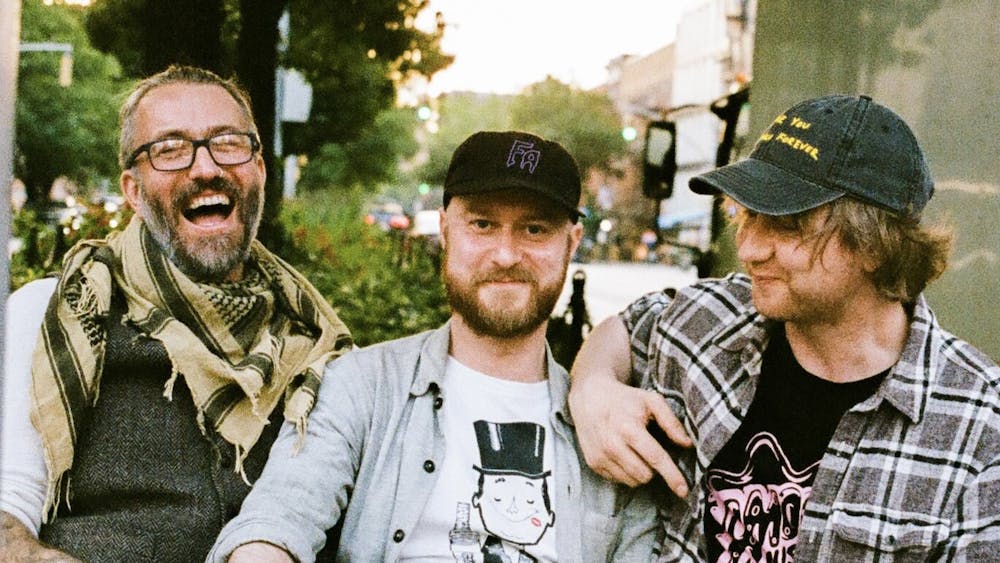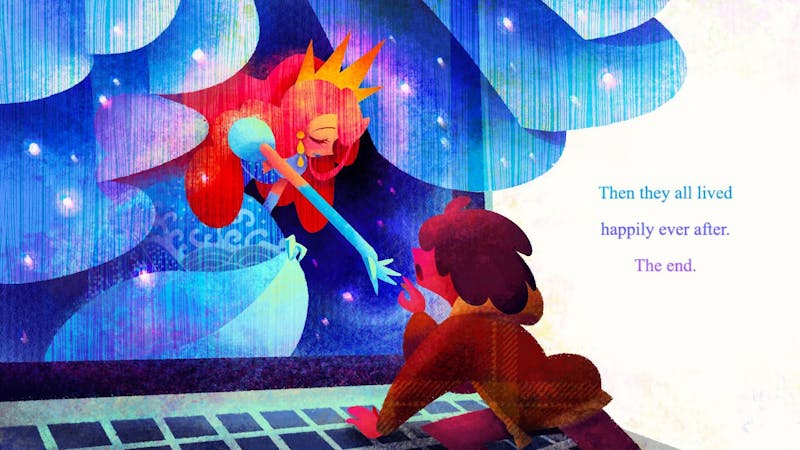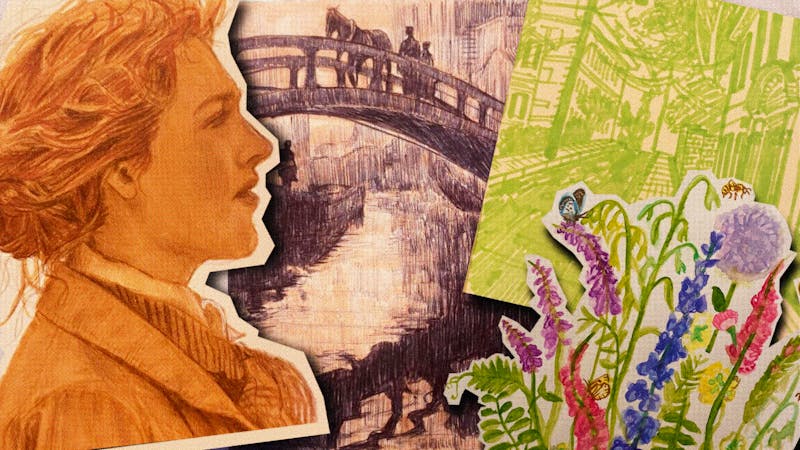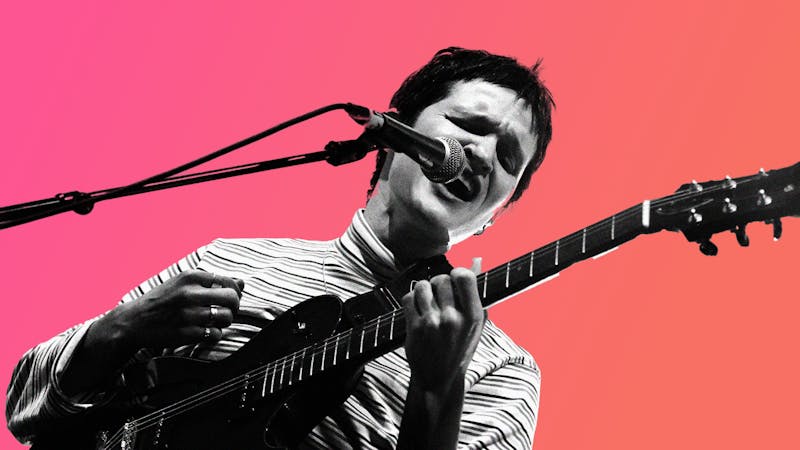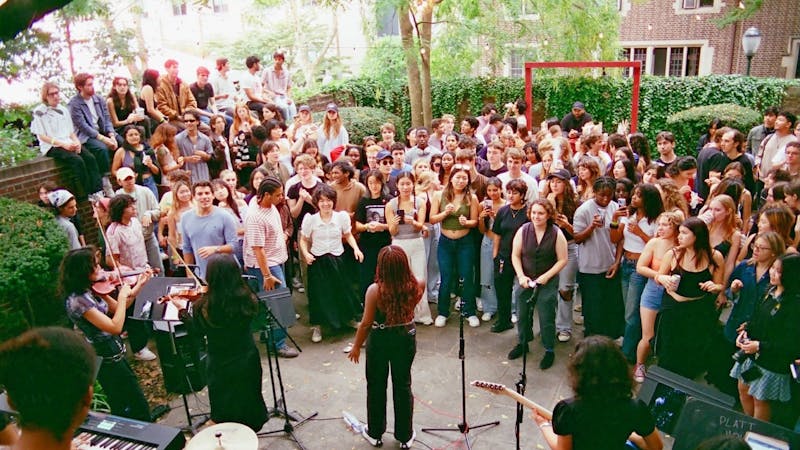Anticipation is a collective experience everyone in the room shares as I peer over the balcony, looking at both the crowd in the pit, and also the band on stage. Noise pop encroaching on shoegaze, the songs that play are less about the lyrics and instead hinge on components that build the atmosphere. People sway, but are otherwise static, and I can’t hear anything but the band; an experience I had not been privy to when I’d previously frequented concerts at The Fonda Theatre. I can’t make out much of the lyrics, and most people around me aren’t singing. Looking at the legions of teenagers underneath me, the audience is hypnotized by the dreamy visuals that complement the ambient sound.
But nearly everyone knows the coming melancholy lyrics: “She's forgotten her car keys / And the flowers for her friends / They say she's a harpy / But she is on her meds.” My voice cracks, as I sing along, emotional at the chance to see a band live that I thought didn’t even exist.
Genial voices coated by thick British accents pop out in between songs, profusely thanking the audience for coming; for allowing them the opportunity to play. Who is this band, that looks and speaks so differently from their angsty lyrics and experimental electronic interjections?
July 2016, Nottingham: a man is perusing CDs at an Oxfam charity shop, his local thrift shop. The discs clank one after the other as he fingers through them when something catches his eye—an anime figure (later realized to be from the manga Mint na Bokura) stares at him, a barely legible name in an obtrusive font scrawled across—D>E>A>T>H>M>E>T>A>L by Panchiko. The man listens. It’s a gold mine—the heavily distorted, staticky–sound due to disc rot emulsifies the indie, somewhat shoegaze, and trip–hop influenced EP into a hypnotic listen. Only the first names of the supposed members are visible on the CD–R cover. There’s no record of this band anywhere. The man does what not many would be brave enough to do. He goes on 4chan, to the music board, /mu/.
Turns out good things can come from 4chan. The demo spreads throughout niche music communities on forums like Reddit before finding its way to YouTube and other social media platforms. A cult following begins, made up of devotees who love the music and those who are intrigued by the lost wave. A camp of Panchiko listeners believe the original 4chan poster was simply marketing his own music, though he didn’t follow up to claim his newfound fame. Another sect believes it was a side project of an already famous band: Death Grips, making their own secret virtual Gorillaz–esque band.
But in 2020, great internet sleuthing won the day, and the mystery of the infamous band was solved.
If you aren’t chronically online, you likely haven’t heard of Panchiko—but don’t feel bad. For 20 years, its own members haven’t even known of their success online. “We don’t know our own lore,” vocalist and guitarist Owain Davies says, while their cult following has uncovered artifacts that the band itself has yet to realize. To a select thousands of devoted fans, Panchiko is the pinnacle of the lost wave, and their discovery has led to a treasure trove of demos and eventually new work from the reunited band.
Davies, who is from Wales, was in the original band with bassist Shaun Ferreday and guitarist and keyboardist Andy Wright. Wright was tending to a toddler at home and couldn’t be a part of the interview. Guitarist Rob Harris and drummer John Schofield have since joined the remaining founding members in 2020. The original drummer was not able to be contacted.
Panchiko is about to embark on their third tour in North America, with supporting acts Wisp, Glare, TAGABOW, and Weatherday. They’ve been pretty busy, as their first date in Berkeley, Calif. is just a few weeks away on April 16. And yet, the band tries to keep their practicing to “a bare minimum,” Davies says, laughing. He asks, “Are you rehearsing, Shaun? I’m rehearsing bits at home.” Ferreday replies: “I’m practicing. I’m learning our song.”
The band is based in Nottingham, or “right bang in the middle of England,” according to Davies.
They made D>E>A>T>H>M>E>T>A>L in 2000, while in while in sixth form, which the band is nice enough to translate—it's the American equivalent of high school, when the lads were 16 to 18 years old. Ferreday lived how many doors down? He counts on his hand, realizing the number is three—three doors down from Wright. As young teens, they began organizing practice sessions. Recorded on an 8–track digital recorder, the group produced their EP, with near–CD quality. “But it didn’t sound like [CD quality] when people found it on the Internet. It sounded a lot worse.”
Panchiko disbanded somewhere between 2001–2003 (their memory’s a bit hazy) because they were going to university. Not attending university was never a consideration. “You didn’t have time,” Davies says, speaking to the need to practice consistently when in a band. Ferreday agrees, adding that “Life happened.” The two both talk a lot about back–up plans and the importance of having one. Moreover, they weren’t getting gigs or encouragement to keep making music.
Decades ago, a pre–Internet music industry, sans SoundCloud or Napster, meant that Panchiko relied on sending their physical demos to record companies, booking gigs, and word of mouth to get their music out there. Only around 30 copies of D>E>A>T>H>M>E>T>A>L were made, one of which found its way to the Oxfam charity shop.
Davies was the first to find out that he and his high school friends had gained fame without their knowledge in the last couple of years. Davies was also at home, in the flat that he’s currently Zooming from while we’re talking.
When I learned Panchiko was in fact, real, I, too, was at home. I was scrolling on TikTok in my bed, as was customary during the pandemic. “PANCHIKO MEMBERS FOUND,” the TikTok read. I sat up straight from my fetal position, mouth agape, and immediately sent the video to my friends.
Davies recalls, “I was in my bedroom in the basement. It was a dark, January morning. I woke up, picked up the phone, had some weird Facebook messages on a defunct music site. There were two people asking about the band Panchiko, which immediately got me thinking, that’s weird, because, like, literally no one knows the name of that band. That’s a band I was in at school. We made a CD. We never put it on the Internet. The only people who thought about it are us and some of our school friends, and why would they even be thinking about that band? 20 years later?” He responded ominously to the Facebook inquiry: “Oh, I don't know. Maybe I am, maybe I'm not.”
The inquirers nudged further. They had diverging interests: one really liked the music, the other thought it was “just alright.” And yet, they both tested Davies—how do we know if it’s really you? After prowling on the Internet for years, a false prophet was not to be trusted. Davies thought back to decades ago when he made the record, and recollected that the sample he put in the title track was from a Sega Saturn game’s warning message. It tracked.
Ferreday was eating a sandwich in a lorry after he had gotten out of a tree that he was climbing when he found out. “I thought it was truly, truly, strange and bizarre,” says Ferreday. Wright was in Korea when Davies contacted him, which prompted them to—for the first time—Google themselves. It was just then that the band read the thousands of comments about them that spanned across multiple sites. It was Wright who convinced the others to get the band back together, as Davies was a bit reluctant, while Ferreday says, “I didn't have a whole lot else going on.” But still, he “was apprehensive having not picked up an instrument in over a decade,” questioning if he even knew how to still play. He contends that he didn’t. “You start at rock bottom, you can only get better,” Ferreday laughs.
Wright had continued to work in the music industry post–Panchiko’s early years as a sound engineer. “He's been a major driving force, and really good at getting so many things organized. We wouldn’t be here without his energy,” Davies says, before cheekily adding, “Nobody tell him this.” Wright was able to clean D>E>A>T>H>M>E>T>A>L, which previously floated around the web in its heavily distorted version. A remastered and reissued version of the EP came out Feb.16, 2020.
For a band whose cult following started very online, the members are very much not. “We just don’t do the Internet thing,” Ferreday says. “I stopped at Facebook.” Since then, Ferreday says they’ve been “slowly making [their] way back to modern technology.”
“You can get a bit stuck in your ways as you age,” Davies says, poking fun at the fact that he adds “the” in front of TikTok when talking about social media platforms. But given the age of their main demographic of listeners, being Internet savvy, or at least Internet proficient, is necessary to connect with their fans. He jokes that fans would’ve found them much faster if they looked on Facebook first. “Everybody [says Facebook] is just full of boomers. They never thought they were they were searching for boomers.”
Panchiko is cognizant of the strange phenomenon of performing in their 40s, singing songs written when they were teens, to an audience of current teens. “I guess it’s good because people are feeling the things that I felt when I wrote that thing.” But still, the perfectionist in Davies can find his angsty, 17–year–old lyrics a bit cringe.
“I totally want to change all the lyrics,” Davies says. “I just think some of them are weird.” One of these changes came with his realization of the constant use of female pronouns in his songs. He reflects now, “Who am I to comment on what about women and stuff? I’m a man.”
Following the release of their debut album, Failed at Math(s) on May 5, 2023, Panchiko performed with LSD and the Search for God and Horse Jumper of Love on their second full–length United States tour. “On both tours that we’ve done up till now, and on the one coming up, these guys actually wanted to play music with us and be part of what we do,” Ferreday says, still baffled.
“Everybody was very funny, and put up with our British accents in humor, and we got on. I had a great time,” Davies says. “It really sounds cheesy, but it’s the people who came to our shows that made the vibe.” Panchiko played to sold–out venues, playing songs from their EP and album, all while psychedelic visuals in the background accompanied the noise rock. Utilizing LSD’s visuals person, Davies took inspiration from his favorite ’90s anime and games that were pivotal during his childhood and placed visuals of those in the background of their set.
The Venn diagram between Shinnies and Panchiko listeners is a near circle. “I watched [Neon Genesis] Evangelion on VHS back in the day,” Davies says.
“I think the struggle that Shinji goes through is universal and timeless. And it’s really interesting [that] that resonates today,” Davies says. He also names Akira and Studio Ghibli films as being timeless as well, and described the entire process of choosing visuals as them just “geeking out.” I let Davies know of the Internet’s supposition that the band just knows its target audience well, and he tells me it wasn’t part of his masterplan. Still, the shared excitement on stage and in the pit is emblematic of the band’s special bond with its fans.
The resurrection of Panchiko speaks to the subcultures of the 90s that existed largely in small underground circles, which boast a new generation of aficionados today. Panchiko, like Evangelion, has found newfound love from younger people via mainstream streaming platforms. While their origins are rooted in the physical (CDs and VHS tapes), their popularity proliferates in the digital realm, and the band is cognizant that this change has its benefits.
Many musicians, with good reason, lament the industry in the age of the Internet and streaming. But for bands like Panchiko that have gained a second chance because of the Internet and its communities, this unprecedented accessibility to music is anything but a career killer.
“It’s incredible. I understand other people’s perspectives on it. You know, their views that maybe it’s killing music; but from my experience it's completely opposite,” Ferreday says. “I think it’s fantastic. We all have immediate access to anything you can conceivably want to listen to. But you only have to have a fleeting thought about a song that you might have been 20 years ago, and it’s immediately at your fingertips and you can relive the memories from when you heard it then.”
Panchiko has since racked up an impressive 972,650 monthly listeners on Spotify. Their most famous song, the title track from D>E>A>T>H>M>E>T>A>L, has a cumulative 24,553,945 plays. The band is grateful, but acknowledges how difficult it is to be a smaller artist without a record label, which forces them to rely on streams as their main revenue source.
“It’s a double–edged sword. As a consumer, there’s never been a better time to have access to music. But as an artist […] [earnings have] been significantly reduced from what it might’ve been” Ferreday says. And yet, it’s the cycle of money garnered from streaming to funding tours, to making records, that keeps their band alive.
For the past half year, Panchiko has been writing and producing “easily an album’s worth of music already.” “It’s been hectic, it’s a very new pace of life,” Ferreday says. But they take their newfound business with gratitude. “I think being handed an opportunity like this back to you, you know? I'm not going to waste this. Life’s precious and time is precious,” Davies says.
In terms of the future of the band, beyond the recent tour and a new album, Ferreday has his eye on “world domination; apart from that, not really [much]. Just hopefully try to keep doing it as long as people want us to.” Davies interjects, “Yeah, we don’t want to overstay our welcome.”
“If it makes just one person happy, you’ve achieved your goal of making some awesome music,” Davies says. “Keep doing it. But have a backup plan. Do a day job. Stay humble. You learn a lot from normal jobs.” For artists as big as they are, part of their charm comes from their relative lack of knowledge of fame—they call themselves “random blokes.” So take their insight with a grain of salt: “There’s no expert advice on this. Because we completely, randomly fell back into this.” Wright and Davies have been able to quit their normal jobs, and the hope is to continue this momentum full–time for the entire band.
The chance of becoming famous, virtually instantaneously from a high school band project, is something of outlandish fiction. The inconceivable circumstances that allowed Panchiko to regroup are not lost on the band. “It's such a privilege and an honor,” Davies says. “You can only dream of it when you make music, that you’ll connect with people.”
